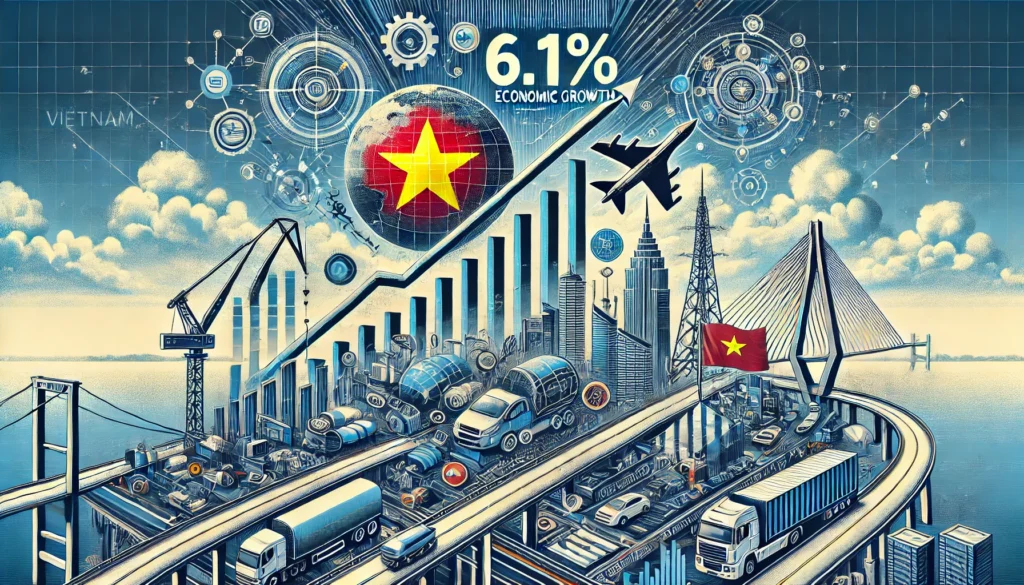Vietnam’s economy is expected to grow by 6.1% in 2024, according to a recent projection by the World Bank. This forecast highlights the resilience and potential of Vietnam’s economy, which continues to thrive despite global uncertainties. The projection reflects Vietnam’s strong economic fundamentals, strategic reforms, and increasing integration into the global market.
Strong Economic Fundamentals
Vietnam’s economic growth is supported by a robust foundation of strong fundamentals. The country’s prudent macroeconomic management, including maintaining stable inflation and a well-managed fiscal deficit, has helped create a favorable environment for sustainable growth. Additionally, Vietnam’s young and dynamic labor force, coupled with its strategic geographical location, positions it as a key player in global supply chains, particularly in manufacturing and agriculture.
Manufacturing and Export-Led Growth
Vietnam’s manufacturing sector remains a crucial driver of economic growth. The country has successfully attracted significant foreign direct investment (FDI), particularly in high-tech industries and electronics. Major global companies have established manufacturing bases in Vietnam, contributing to the country’s export growth. The World Bank’s projection for 2024 reflects confidence in the continued expansion of these sectors, driven by increasing demand for Vietnamese-made products in international markets.
Diversification of Export Markets
In recent years, Vietnam has diversified its export markets, reducing reliance on a few key partners. The country has signed multiple free trade agreements, including the Comprehensive and Progressive Agreement for Trans-Pacific Partnership (CPTPP) and the European Union-Vietnam Free Trade Agreement (EVFTA), which have opened up new opportunities for Vietnamese goods in global markets. This diversification strategy is expected to play a significant role in sustaining Vietnam’s economic growth in the coming years.
Ongoing Reforms and Policy Initiatives
Vietnam’s government has been proactive in implementing reforms aimed at enhancing the business environment and boosting economic resilience. Key reforms include streamlining administrative procedures, improving infrastructure, and investing in human capital development. These efforts are designed to enhance the competitiveness of Vietnam’s economy, attract more foreign investment, and support innovation and entrepreneurship.
Infrastructure Development
Infrastructure development is a critical area of focus for Vietnam’s growth strategy. The government has prioritized investment in transportation, energy, and digital infrastructure to support economic activities. Major projects, such as the expansion of highways, ports, and power plants, are underway to improve connectivity and efficiency. The World Bank’s growth projection for 2024 takes into account the positive impact of these infrastructure developments on the economy.
Digital Transformation and Innovation
Vietnam is also embracing digital transformation as a key driver of future growth. The government has launched initiatives to promote digital literacy, encourage innovation, and support the development of the digital economy. By fostering a conducive environment for tech startups and encouraging the adoption of digital technologies across industries, Vietnam aims to position itself as a leader in the digital age. These efforts are expected to contribute significantly to economic growth in the coming years.
Challenges and Risks
Despite the positive outlook, Vietnam faces several challenges and risks that could affect its economic performance. These include global economic uncertainties, geopolitical tensions, and the potential impact of climate change. Vietnam’s heavy reliance on exports makes it vulnerable to fluctuations in global demand and trade disruptions. Additionally, the country must address environmental concerns, particularly related to its rapid industrialization and urbanization.
Climate Change and Environmental Sustainability
Climate change poses a significant risk to Vietnam’s long-term economic growth. The country is highly vulnerable to climate-related events, such as typhoons, floods, and rising sea levels. To mitigate these risks, the government is focusing on promoting sustainable development practices, investing in renewable energy, and enhancing disaster preparedness. By addressing these environmental challenges, Vietnam aims to ensure that its economic growth is sustainable and resilient.
Conclusion: A Promising Future
The World Bank’s projection of 6.1% growth for Vietnam in 2024 is a testament to the country’s economic resilience and potential. With strong economic fundamentals, ongoing reforms, and a strategic focus on infrastructure and digital transformation, Vietnam is well-positioned to sustain its growth momentum in the coming years. However, to fully realize this potential, Vietnam must continue to address the challenges it faces, particularly in terms of environmental sustainability and global economic uncertainties.
Internal Links:
- Vietnam’s Development and Export Growth Under EVFTA
- Sourcing from Vietnam: A Comprehensive Guide
- Sourcing Construction Materials from Vietnam
External Links:

